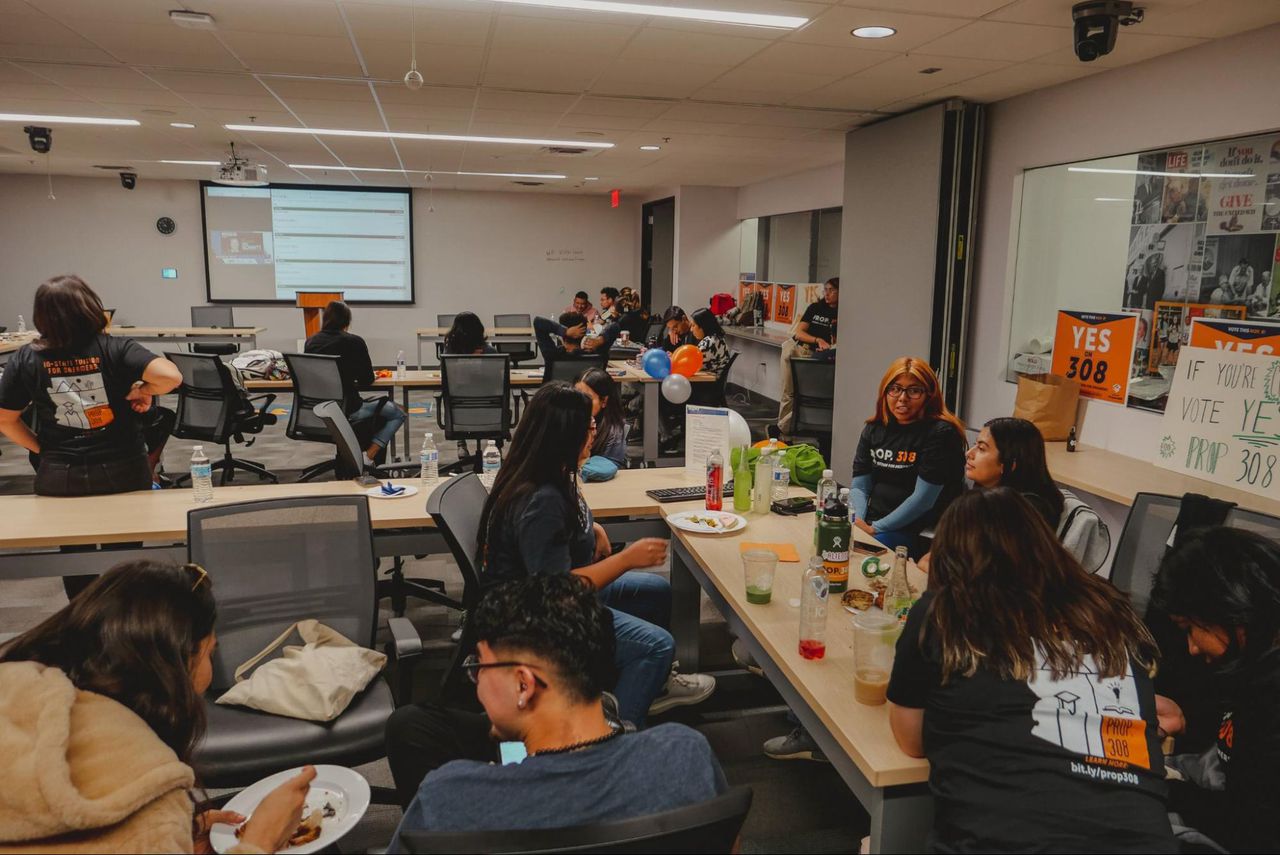Undocumented students win a fight for educational equality in Arizona
Editor’s note: This story first appeared on palabra, the digital news site by the National Association of Hispanic Journalists.
By Maritza L. Félix
It was Election Night 2022 and José Patiño could barely contain his tears. His lips trembled and his eyes were red from sleeplessness, exhaustion, and emotion. Arizona residents were voting on a proposition that would allow undocumented immigrants and DACA recipients to be eligible for in-state tuition and financial aid at state universities and community colleges. Patiño is not eligible to vote, but he had worked hard to get Proposition 308 on the ballot. The only thing he could do as the returns came in was to check and refresh the Arizona Secretary of State’s website to look for new numbers. He did it every five minutes, again and again, praying and hoping his efforts were enough this time around.
Patiño is undocumented by some definitions, a dreamer by nature, and a DACA recipient by virtue of politics. As a beneficiary of the federal program called Deferred Action for Childhood Arrivals, also known as Dreamers, Patiño has been lobbying since 2018 for a bill to support undocumented students. He is the vice president of education and external affairs for Aliento, a nonprofit organization in Phoenix whose mission includes empowering Dreamers and pushing for legislative reforms that give them a path to legalization. He holds a Bachelor’s degree in Mechanical Engineering from Arizona State University and a Master’s degree in Secondary Education from Grand Canyon University.
Proposition 308 allows undocumented students to qualify for in-state tuition if they graduated from and attended at least two years of an Arizona public or private high school or homeschool equivalent. It also allows any student, regardless of immigration status, to be eligible for state financial aid at public universities and community colleges. Patiño is one of those students. On Election Day he felt as though Arizona voters were deciding his future.
Volunteers at Aliento watch party on Election night. Photo by Daniel Robles for palabra
To get Proposition 308 on the ballot, supporters had to first get Republicans in the state legislature to back the measure.
“This time around, we needed two Republicans who were willing to go against their party and take all the heat and all the fire,” Patiño said.
In 2022, quietly moving forward, he looked for allies in both parties and helped draft a bill that could get bipartisan support.
“We were able to do it because it was very secret,” Patiño said. “You’re asking Republicans to put their careers on the line and commit, in many ways, political suicide. But they were strong in their values … and they did it, and we were able to pass it.”
The first election returns came in around 8 p.m.
Patiño’s jaw began to tremble with emotion and he clapped loudly as if with the movement of his hands he could push away the tears that ran down his cheeks. Votes in favor of Proposition 308 were leading those opposed to the measure. “For the longest time, we were always told ‘no.’ It would mean so much to be able to be like, ‘yes,’ like finally, you get a yes.”
“I feel like they finally see us, like they finally recognize that we are here,” Patiño said.
But he said it cautiously, measuring his words.He couldn’t claim victory yet. Staying calm and not overthinking was hard. But that was not new to him. He has experienced the mental and emotional challenges of being undocumented.
Telling their stories
Patiño and dozens of volunteers spent months knocking on doors, encouraging Latinos in Arizona to vote, and explaining to others what it was like to live as an undocumented student. They shared the stories of their dashed dreams and the desire they had to use their talent, education, and strength to make the U.S. a great nation for all, to fight for a country they consider home.
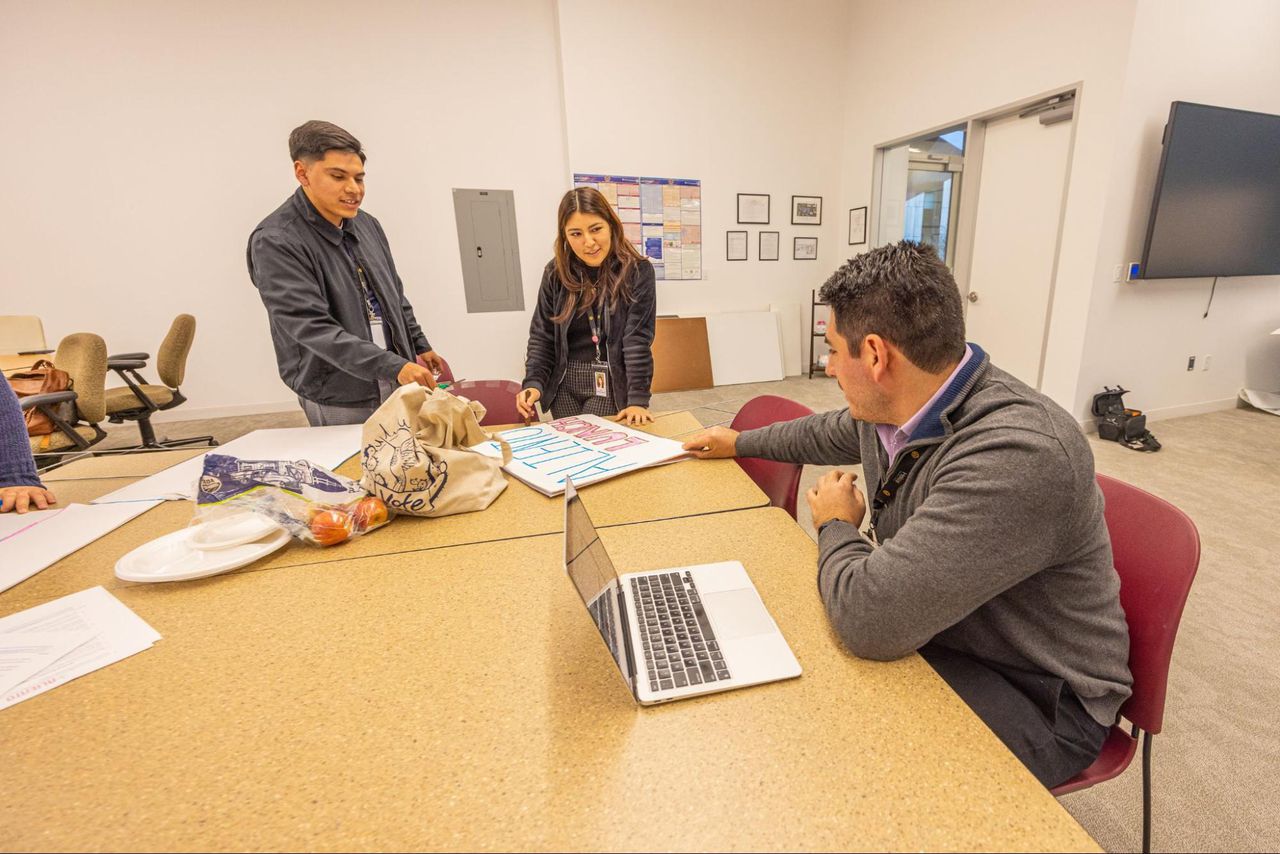
José Patiño (left) and volunteers at Aliento headquarters in Phoenix. Photo by Daniel Robles for palabra
The results were certified almost a month after the election – Proposition 308 won by just over 60,000 votes. Then-Governor Doug Ducey signed the bill, and it became law on December 5, 2022.
That same month, Arizona’s community colleges and universities changed their procedures and policies to abide by the changes that will go into effect for the 2023 spring-summer semester.
Now, undocumented students who used to pay up to $30,000 annually in tuition to attend college, would pay about half that amount.
It’s estimated that the more than 3,600 undocumented students who graduate from Arizona high schools every year could benefit from the new law, according to Education Forward Arizona.
The adoption of Proposition 308 marked a dramatic reversal. In 2006, voters in the state approved a measure that barred undocumented students in Arizona from having access to in-state tuition or financial aid that is funded or subsidized by the state.
“It didn’t matter what you did, it didn’t matter that you worked so hard and did your homework. It didn’t matter that you were top of your class. It didn’t matter that you did all these scholarship applications,” said Patiño of that earlier measure, known as Proposition 300. “We weren’t good enough to go to the university. You were not good enough to get the scholarship. You were always treated differently. And I always thought it was like, ‘This is not fair.’”
The restrictions included in Proposition 300 meant that it took Karina Ruiz 12 years to finish college, instead of the typical three or four years. Ruiz leads the Arizona Dream Act Coalition, a nonprofit dedicated to fighting for immigrants’ rights and for higher education access for immigrant youth in Arizona. Like Patiño, she is undocumented. Under Proposition 300, Ruiz had to pay three times as much per college credit compared to Arizona citizens and residents with legal status, and she could not qualify for most scholarships.
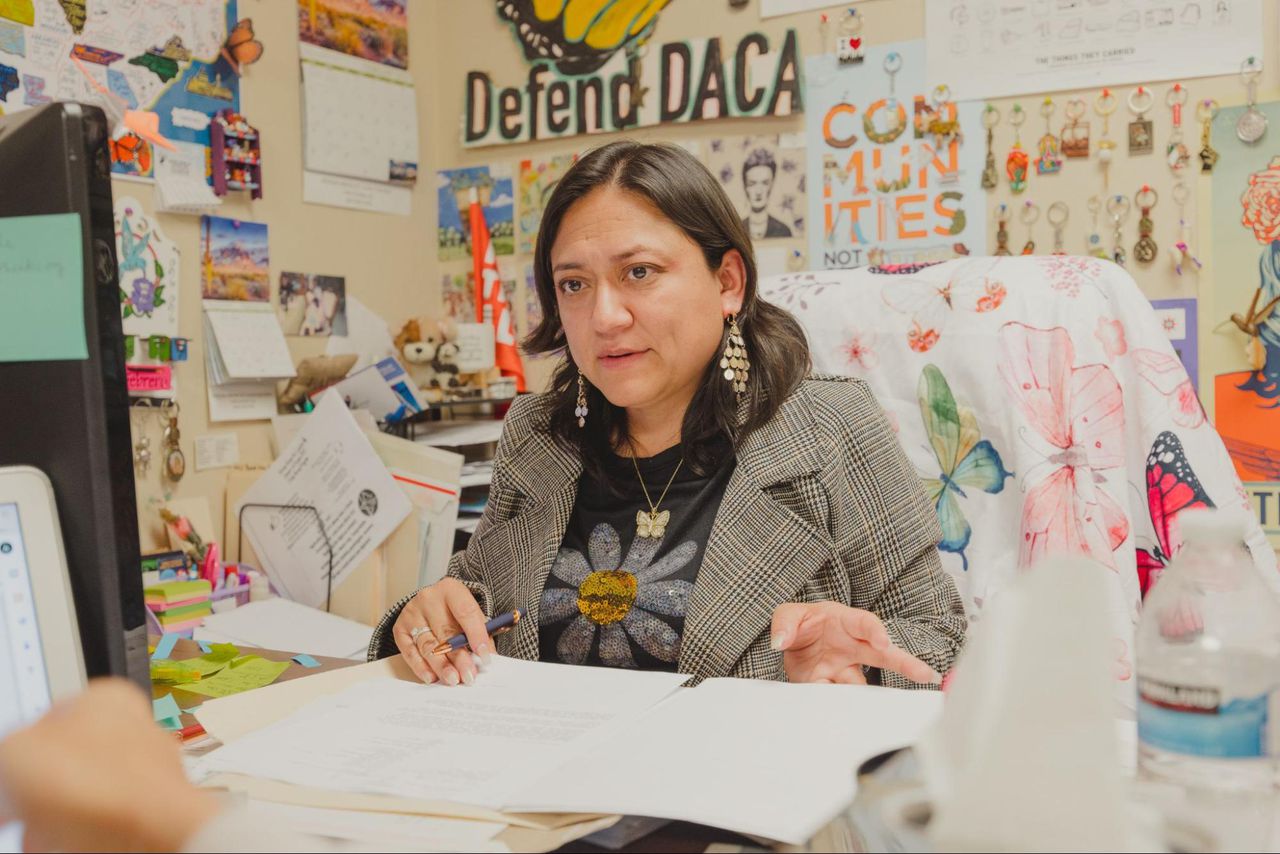
Karina Ruiz at her Arizona Dream Act Coalition office. Photo by Daniel Robles for palabra
“I was going to graduate (and) have a degree, but I was not going to be able to work because I did not have a work permit … so it was very difficult to decide between eating and raising a family or studying,” she said.
Ruiz graduated in May 2015 from Arizona State University with a Bachelor of Science in Biochemistry. Her three children are U.S. citizens, and her eldest voted for the first time in the 2020 election to represent the values and priorities of his mixed-status family.
Research from the American Immigration Council indicates that earning a college degree by paying in-state tuition would boost the earnings of Arizona’s Dreamers by more than $28 million annually. That also could mean an increase of almost $5 million annually in federal, state, and local tax revenues.
According to the National Conference of State Legislatures, Arizona joins 19 other states that allow for in-state tuition for undocumented students: Arkansas, California, Colorado, Connecticut, Florida, Illinois, Kansas, Maryland, Minnesota, Nebraska, New Jersey, New Mexico, New York, Oregon, Oklahoma, Rhode Island, Texas, Utah, and Washington.
But that doesn’t mean that the fight is over. Nine Republican-led states recently asked a Texas judge to end DACA. If the court rules against the federal policy it would end the protection that Dreamers now have against potential deportation. Undocumented students in Arizona would still be able to get in-state tuition, but they would not be able to renew their federal work permits.
“DACA is not a permanent solution either; they can remove it at any time and return us to limbo,” Ruiz explained. “That is what we are seeing; we have to continue fighting for a path to legalization.” A bipartisan DACA bill with a path to citizenship was recently reintroduced in the U.S. Senate.
On the night of November 8, Patiño and Ruiz were in two separate locations in Phoenix. Both say they went to bed that night with more hope than uncertainty, and after a long time, they say they were able to let go of their fears, even for just a few hours. Deep in their hearts they knew that Prop. 300 would soon be overturned.
The future
For Zabdi Hernández Pérez, the passage of Prop. 308 represents the opportunity to keep dreaming. She was brought to the U.S. from Puebla, Mexico, when she was a baby and is the first in her family to graduate from college. She did it by herself, working to pay her tuition, and is a DACA beneficiary.
“It was getting difficult.The school (high school) was telling me, you can’t do it, you’re not going to graduate with college classes. And I kept fighting my way and fighting my way. And senior year came. I had one year under my belt and I was the first student immigrant to ever graduate with college credits in that school. And I feel like now everything has a purpose,” she said.
Hernández Pérez can now afford to pursue a master’s degree in Arizona, while continuing to work and volunteer for causes that help Dreamers like her achieve a path to legalization.
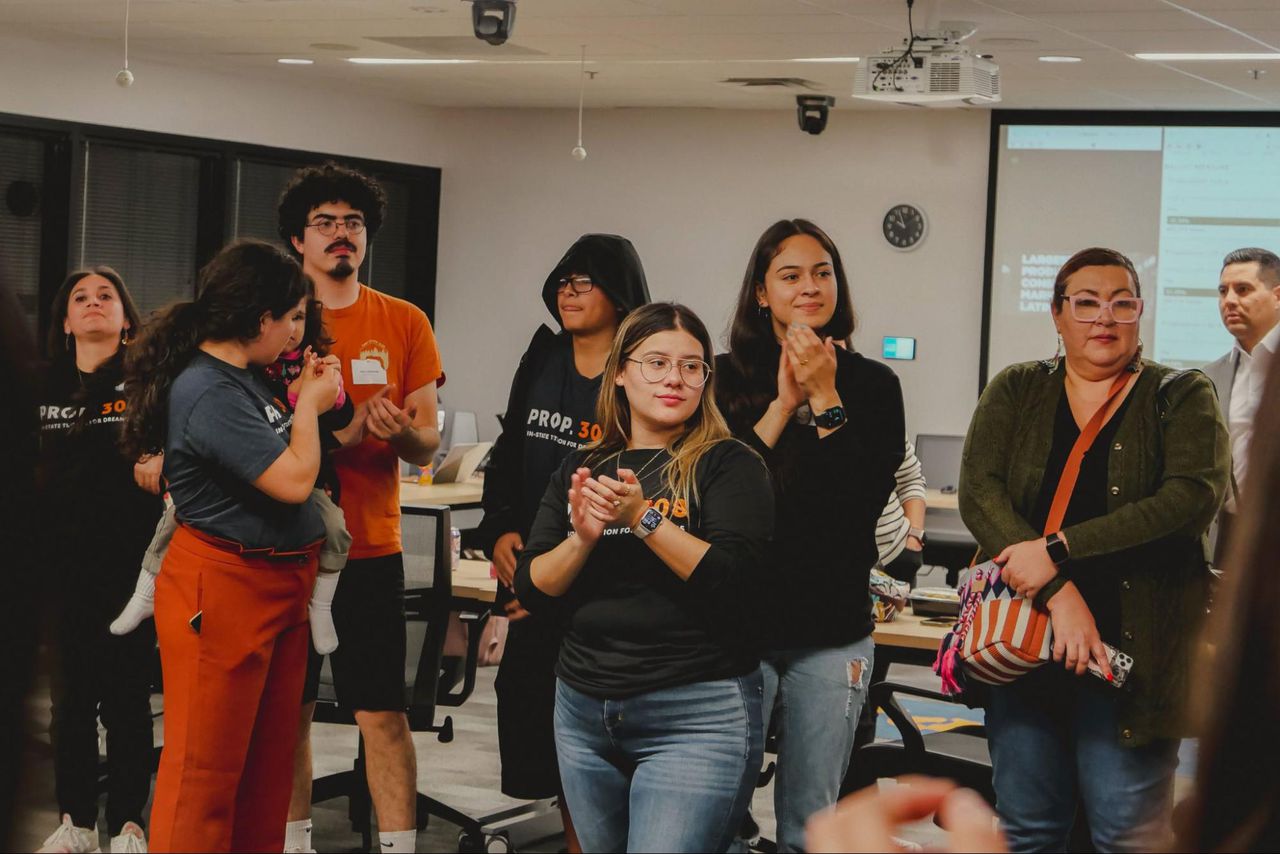
Volunteers wait for Election Day results on Prop. 308 at the Aliento watch party in downtown Phoenix. Photo by Daniel Robles for palabra
There are thousands of stories like those of Hernández Pérez, Patiño, and Ruiz in Arizona, where more than 36,000 Dreamers are eligible for DACA. According to Higher Ed Immigration Portal, a digital platform that focuses on DACA information, the United States is home to more than 427,000 undocumented students enrolled in higher education; more than 9,000 are in Arizona.
“It’s very emotionally and psychologically taxing … trying to prove to people that you are human and you are equal or have the same rights that they do,” Patiño said.
But he still keeps dreaming.
“I dream of a world where everybody has an opportunity,” Patiño added.”Some equality, some balance, some fairness. Doesn’t matter where you were born, your legal status, your gender, your ethnicity, your class, It matters what is within you. And that’s the thing that you’re going to receive because you work for it.”
—
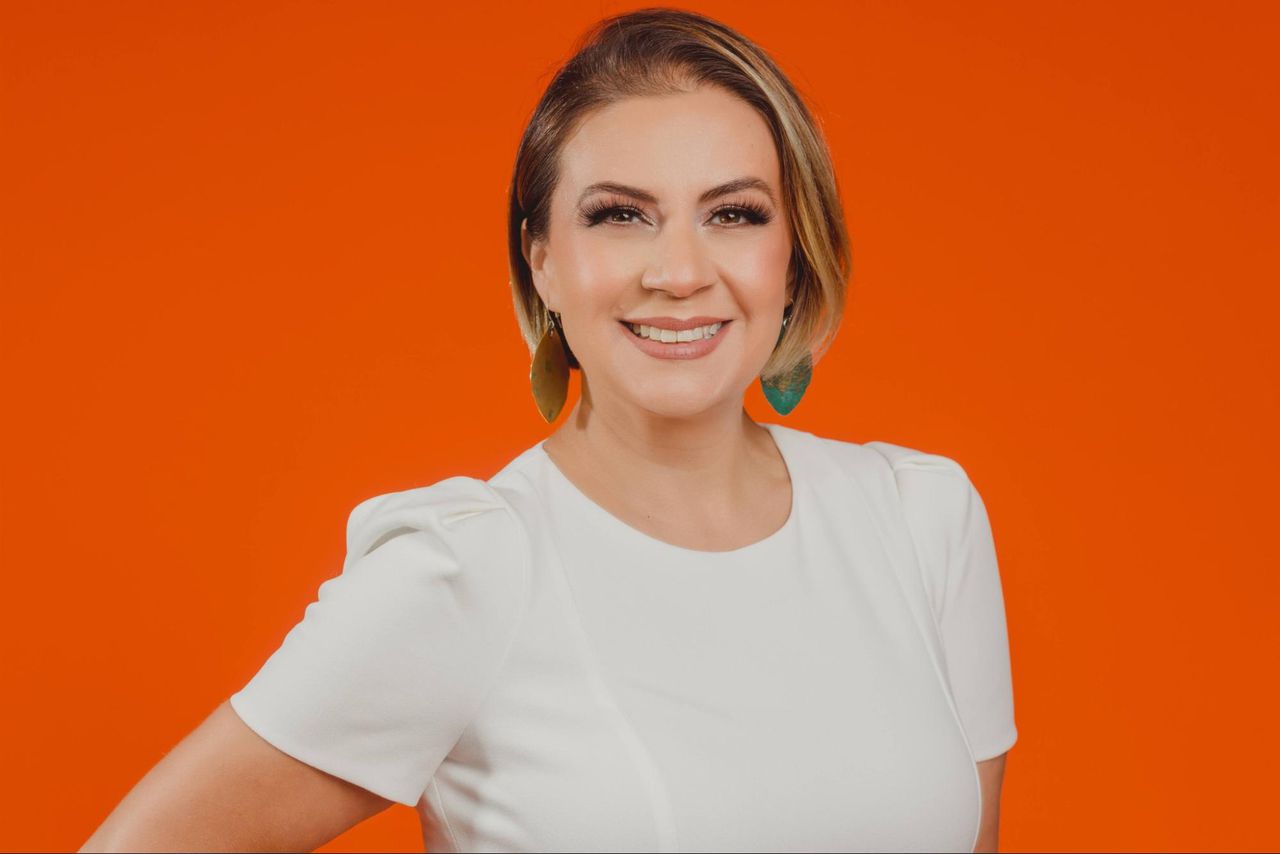
Maritza L. Félix is an award-winning independent journalist, producer, and writer in Arizona.
Maritza L. Félix is an award-winning independent journalist, producer, and writer in Arizona. She is the founder of Conecta Arizona, a news-you-can-use service in Spanish that connects people in Arizona and Sonora, Mexico primarily through WhatsApp and social media. She is the co-founder, co-producer, and co-host of Comadres al Aire.
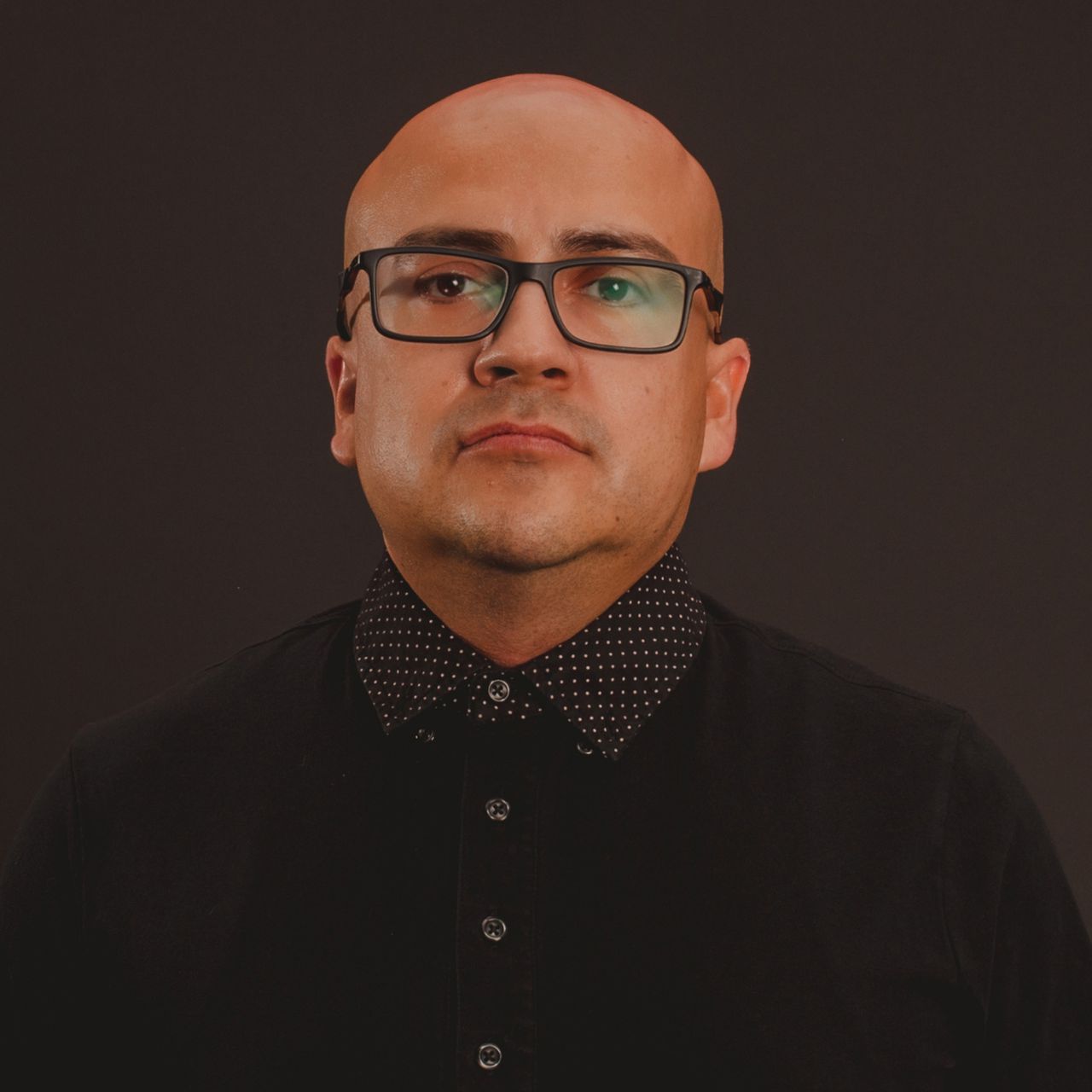
Daniel Robles is an independent photographer and graphic designer with over 18 years’ experience. He is the art director for Conecta Arizona.
Daniel Robles is an independent photographer and graphic designer with over 18 years’ experience. He is the art director for Conecta Arizona. His work has been featured in different magazines and media outlets internationally.
